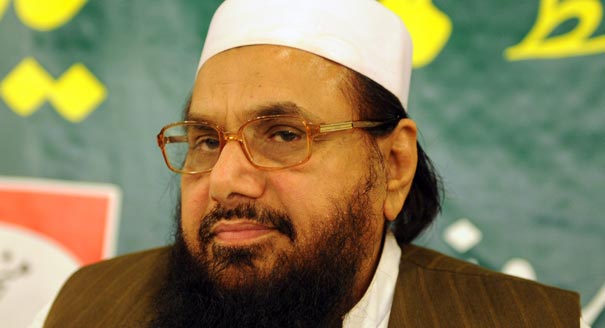Pakistan has significantly bolstered the security of Lashkar-e-Taiba (LeT) founder Hafiz Saeed in the wake of the recent terror attack in Pahalgam that claimed the lives of 26 civilians, according to a report from IndiaToday Indian intelligence sources revealed. The increased protection follows strong suspicion of Saeed’s involvement in the April 22 attack, which has reignited diplomatic hostilities between India and Pakistan.
Security around Saeed’s residence in Lahore’s densely populated Johar Town has been tightened drastically, with a 24-hour deployment of armed Pakistani Army personnel. Surveillance has been ramped up using drone technology and advanced gesture-detection CCTV systems covering a one-kilometre radius. Roads within a four-kilometre zone are also under constant video monitoring. Civilian access has been blocked, and the use of drones in the area is prohibited.
Saeed, officially serving a 46-year sentence on terror-financing charges, has not been confined to a conventional prison. Instead, his Lahore home has been designated as a “sub-jail,” a move that allows him relative operational freedom under the guise of incarceration. This arrangement permits restricted movements while maintaining the illusion of custody.
SSG Commandos have been Deployed
According to reports, the Inter-Services Intelligence (ISI), Pakistani Army, and Lashkar operatives are collectively managing Saeed’s security detail. Former Special Service Group (SSG) commandos have also been deployed. India Today’s exclusive satellite imagery reveals the extent of the security infrastructure: a fortified residence, a large mosque and madrasa believed to be part of Saeed’s operations, and a newly built private park—all within the compound.
Security forces believe the Lashkar module responsible for the attack has been active in the region for some time and was previously involved in deadly incidents in Sonamarg, Boota Pathri, and Ganderbal. In October 2024, attacks attributed to this group resulted in the deaths of Indian Army personnel and several civilians, including tunnel workers and a doctor. Intelligence suggests that orders and logistical support are being provided directly by Hafiz Saeed and his deputy, Saifullah, from Pakistani territory.
Indian security agencies maintain that while the attack was claimed by The Resistance Front (TRF)—a known front for LeT—Hafiz Saeed played a key role in planning the operation. Saeed has been publicly visible over the past three years, with over two dozen appearances despite his supposed imprisonment. He was most recently spotted in February at terror hubs in Pakistan-occupied Kashmir, including Muridke, Rawalkot, and Bahawalpur.
India Responds Quickly to the Terrorist Attack
India has responded strongly to the attack. On Wednesday, the Cabinet Committee on Security (CCS), led by Prime Minister Narendra Modi, met in an emergency session. Several retaliatory measures were announced: a sharp reduction in diplomatic staff in both countries from 55 to 30, expulsion of Pakistani military staff from India, and withdrawal of Indian personnel from Islamabad.
Further, the SAARC Visa Exemption Scheme for Pakistani nationals has been suspended, and the Attari-Wagah border has been shut down indefinitely. Existing visas for Pakistani citizens in India have been revoked, with a mandatory exit deadline of May 1. India also declared the suspension of the Indus Waters Treaty of 1960.
The attack and its fallout have triggered mass protests across India, particularly outside the Pakistan High Commission in New Delhi’s diplomatic zone. Demonstrators condemned the attack, and security personnel were deployed in large numbers to manage crowds. Rallies were also reported across Jammu and Kashmir and other states.


